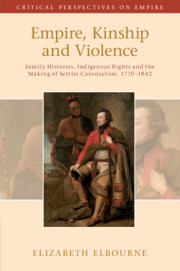 Empire, Kinship and Violence
Empire, Kinship and Violence Book contents
- Empire, Kinship and Violence
- Critical Perspectives on Empire
- Empire, Kinship and Violence
- Copyright page
- Contents
- Figures
- Maps
- Acknowledgements
- A Note on Nomenclature
- Abbreviations
- Introduction
- Part I North America
- Part II Upper Canada, New South Wales, Van Diemen’s Land, Victoria, Western Australia, the Cape Colony, Sierra Leone
- Part III Britain, the Cape Colony, West Africa
- 8 Colonial Sins and Priscilla Buxton’s Quest for Virtue
- 9 Keeping Colonialism in the Family
- Conclusions
- Bibliography
- Index
Conclusions
from Part III - Britain, the Cape Colony, West Africa
Published online by Cambridge University Press: 15 December 2022
- Empire, Kinship and Violence
- Critical Perspectives on Empire
- Empire, Kinship and Violence
- Copyright page
- Contents
- Figures
- Maps
- Acknowledgements
- A Note on Nomenclature
- Abbreviations
- Introduction
- Part I North America
- Part II Upper Canada, New South Wales, Van Diemen’s Land, Victoria, Western Australia, the Cape Colony, Sierra Leone
- Part III Britain, the Cape Colony, West Africa
- 8 Colonial Sins and Priscilla Buxton’s Quest for Virtue
- 9 Keeping Colonialism in the Family
- Conclusions
- Bibliography
- Index
Summary
This book has focused on the relationship between family biopower and empire. It has made the argument that kinship strategies were used by some Indigenous people to try to manage empire, even as imperial power often flowed through elite families. By the 1840s, settler democracy and the growth of settler nations increasingly challenged these forms of power as a mode of governance, despite the continuing power of wealthy families. This concluding discussion uses the example of the failure of the Niger expedition and the colonial buy-out of Indigenous lands in Upper Canada with the Act of Union to illustrate the turn to the settler nation, and the entrenchment of new kinship strategies, focused on the white family of the nation rather than kinship ties between settlers and Indigenous peoples. It also argues that moral colonialism was firmly entrenched as a response to colonial violence and that this vision in itself would become an important justification for the rise of the British empire to world hegemony.
- Type
- Chapter
- Information
- Empire, Kinship and ViolenceFamily Histories, Indigenous Rights and the Making of Settler Colonialism, 1770-1842, pp. 372 - 378Publisher: Cambridge University PressPrint publication year: 2022
